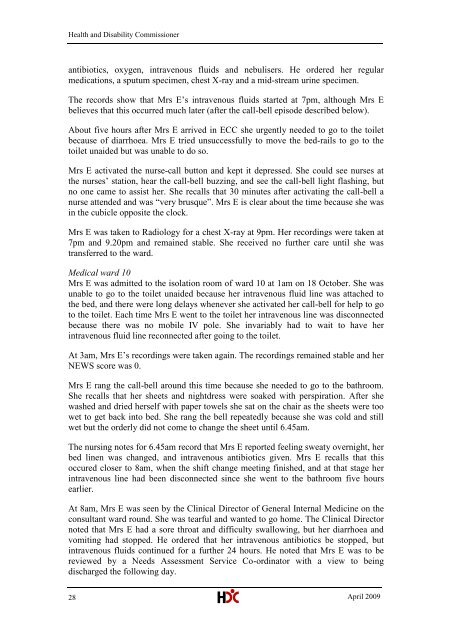North Shore Hospital report - New Zealand Doctor
North Shore Hospital report - New Zealand Doctor
North Shore Hospital report - New Zealand Doctor
You also want an ePaper? Increase the reach of your titles
YUMPU automatically turns print PDFs into web optimized ePapers that Google loves.
Health and Disability Commissionerantibiotics, oxygen, intravenous fluids and nebulisers. He ordered her regularmedications, a sputum specimen, chest X-ray and a mid-stream urine specimen.The records show that Mrs E‘s intravenous fluids started at 7pm, although Mrs Ebelieves that this occurred much later (after the call-bell episode described below).About five hours after Mrs E arrived in ECC she urgently needed to go to the toiletbecause of diarrhoea. Mrs E tried unsuccessfully to move the bed-rails to go to thetoilet unaided but was unable to do so.Mrs E activated the nurse-call button and kept it depressed. She could see nurses atthe nurses‘ station, hear the call-bell buzzing, and see the call-bell light flashing, butno one came to assist her. She recalls that 30 minutes after activating the call-bell anurse attended and was ―very brusque‖. Mrs E is clear about the time because she wasin the cubicle opposite the clock.Mrs E was taken to Radiology for a chest X-ray at 9pm. Her recordings were taken at7pm and 9.20pm and remained stable. She received no further care until she wastransferred to the ward.Medical ward 10Mrs E was admitted to the isolation room of ward 10 at 1am on 18 October. She wasunable to go to the toilet unaided because her intravenous fluid line was attached tothe bed, and there were long delays whenever she activated her call-bell for help to goto the toilet. Each time Mrs E went to the toilet her intravenous line was disconnectedbecause there was no mobile IV pole. She invariably had to wait to have herintravenous fluid line reconnected after going to the toilet.At 3am, Mrs E‘s recordings were taken again. The recordings remained stable and herNEWS score was 0.Mrs E rang the call-bell around this time because she needed to go to the bathroom.She recalls that her sheets and nightdress were soaked with perspiration. After shewashed and dried herself with paper towels she sat on the chair as the sheets were toowet to get back into bed. She rang the bell repeatedly because she was cold and stillwet but the orderly did not come to change the sheet until 6.45am.The nursing notes for 6.45am record that Mrs E <strong>report</strong>ed feeling sweaty overnight, herbed linen was changed, and intravenous antibiotics given. Mrs E recalls that thisoccured closer to 8am, when the shift change meeting finished, and at that stage herintravenous line had been disconnected since she went to the bathroom five hoursearlier.At 8am, Mrs E was seen by the Clinical Director of General Internal Medicine on theconsultant ward round. She was tearful and wanted to go home. The Clinical Directornoted that Mrs E had a sore throat and difficulty swallowing, but her diarrhoea andvomiting had stopped. He ordered that her intravenous antibiotics be stopped, butintravenous fluids continued for a further 24 hours. He noted that Mrs E was to bereviewed by a Needs Assessment Service Co-ordinator with a view to beingdischarged the following day.28April 2009
















